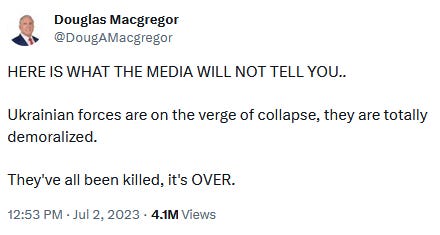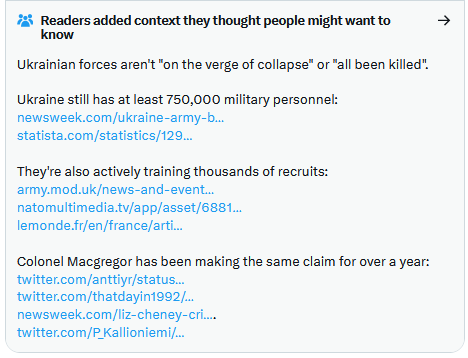Republican Support for Ukraine Has Defied the Odds
Right-wing populists have had a harder time than expected shifting Republican sentiment on the Russia/Ukraine war.
Late last month, Yevgeny Prigozhin led the Wagner Group — a Russian paramilitary force fighting for Putin — out of Ukraine and back into Russia for what some have described as a “weekend rebellion.” Wagner effectively turned on its own country’s government, shooting down several Russian helicopters, taking control of a Russian city, and driving hard toward Moscow in an operation that prompted talk of civil war.
Putin, desperate to avoid such a conflict, worked a deal with Prigmzhin to grant amnesty to Wagner forces and let Prigmzhin leave the country… if they ended their offensive. It would seem the deal was later reneged on, but what was clear at that moment was that Russia was even weaker and more dysfunctional militarily than most had realized. Putin had struggled with his ill-advised invasion of Ukraine from the get-go, and almost a year-and-a-half later, the tide was further shifting away from him (as it continues to do).
As I was following the developments, a name from the not-so distant past popped into my head. It didn’t belong to a Russian or Ukrainian individual, but rather a retired U.S. Army colonel who used to be a frequent guest on Fox News: Douglas Macgregor.
Some may remember Macgregor as Tucker Carlson’s regular go-to guy on the Russia/Ukraine war, who Carlson touted as a knowledgeable, hard-truth-telling authority on the conflict. This was despite Jennifer Griffin, one of the network’s most respected senior journalists, saying at the beginning of the war that Macgregor’s bizarre analysis made him sound “like an apologist for Putin.”
It was a good description of the colonel, considering his wild, factually-challenged claims, but as time went on, Macgregor seemed more like a propagandist than an apologist. His entire shtick over many months was to legitimize Putin’s reasons for invading, declare that Ukraine’s only option was to surrender, downplay Russia’s war crimes, and insist week after week that Russian forces were increasingly strong and within mere days of winning the war.
His narratives were unflinching, even as Ukraine took back key areas and launched effective counter-attacks with western support. Somewhere along the line, the colonel began drawing comparisons of himself to Baghdad Bob, and as was typical with Carlson himself, what Macgregor said was routinely at odds with Fox’s actual reporting and the facts on the ground. Those who turned to Carlson and other Fox prime-timers for their Ukraine news, rather than to legitimate news sources (including Bret Baier’s show on the network), were fed a pro-Putin bill of goods that not only shaped much of the right-wing media’s enduring sentiment on the conflict, but was also given a regular platform on Russian state-run programming.
When Fox gave Tucker the boot following the network’s $787 million Dominion defamation settlement, Macgregor disappeared from the network as well. I was curious what the colonel was saying (if anything) about the latest developments in the conflict, and wasn’t terribly surprised to learn that he had shifted over to YouTube and conspiracy websites, where he was still insisting that Russia was as strong as ever, and about to win the war.
In fact, just over a week after the rebellion, he offered up this beauty:
Verge of collapse? They’ve all been killed? It’s OVER?
Twitter’s Community Notes brigade had a field-day with that one:
It’s hard to say with certainty what motivates someone like Macgregor, who once had the respect of serious people. But it’s pretty obvious why he became a popular figure, and even a thought leader, among the modern right. Pro-Putin views existed among both sides’ fringes prior to Donald Trump’s political rise, but Trump’s incessant fawning over Russia’s president and other tyrants normalized such sentiment among the Republican base. Turning a blind eye to Russian aggression has also been necessary for the “anti-globalist” movement to maintain any level of credence, even though their purported ideology has long lacked any semblance of consistency. Additionally, as far as base-level partisanship goes, good news for Ukraine is bad news for President Biden, who has supported Ukraine’s government (albeit reluctantly at times).
Carlson had an audience to consider, and Macgregor was exactly the type of guy the former Fox host needed to support his performative media-brand, which of course included anti-Ukraine talking points. The truth-averse themes these two continue to foster (from much quieter blow-horns) remain quite popular… at least among the Turning Point USA crowd and faux-populist blowhards like J.D Vance. But surprisingly, they haven’t gained a firm hold with most Republican leaders or even most Republican voters.
As I wrote back in May, I think Carlson losing his gig at Fox, and therefore much of his influence, has had a lot to do with the former. It may even have a fair amount to do with the latter. But I think most Americans, regardless of party, have defied the odds in our often deranged political landscape to identify moral clarity on this issue. While many may not fully grasp the global importance and wisdom of neutering a murderous, war-mongering regime on the world stage, most know that Putin is the bad guy in all of this. And when they see Ukrainians fighting for their lives and the lives of their families against an unprovoked incursion (in which civilians are regularly targeted), they view American aid as morally just and Ukraine’s sovereignty and survival as a worthy investment. They’re also less inclined to buy into propagandist buffoonery like this:
That’s a good thing. And after years of the GOP surrendering its better judgment to a personality cult, it’s at least a little heartening to see one issue in which traditional Reagan-Republicanism has maintained a foothold.







The far right has always had an isolationist, anti-globalist streak. Distrust of the UN, in particular, and even a disregard or disrespect for NATO. This goes back to Pat Buchanan or maybe earlier than that.
So, given that foundation, add in Trump:
- Criticizing our NATO allies for not contributing more to the alliance (which is a legitimate issue, but could have been handled more diplomatically than Trump's usual bull in a china shop approach.)
-Refusing to seriously criticize Putin in any meaningful way, and even praising him on occasion
Plus:
- The Russian collusion hoax pushed by the left wing media characterized Russia as the bad guy, which of course, created an equal and opposite reaction on the right that Russia must be a good guy.
- Criticism of Russia became interpreted as an indirect criticism of Trump, which of course is an indirect criticism of Trump supporters. So the knee jerk reaction on the right was to defend Russia.
- Ukraine was the source of Trump's first impeachment, as well as one of the likely sources of Biden family corruption, so again, Left wing media: Ukraine good, Right Wing media: Ukraine bad.
Mix all of the above together and bake at 350 for 30 minutes, and you have the unappetizing cake that explains the right wing media apologists for Putin.
As for why it's not catching on across the board in the GOP? I think because many GOP leaders play the "Trump is a victim" and the culture war games, because the stakes aren't as high. No real consequence will be felt by complaining about a Bud Lite commercial. However, even today's spineless GOP leaders have enough common sense to understand the implications for the US and the world if we sit back and let Putin take over Ukraine.
Great disection of that shill McGregor who I found to be bizzarely at odds with mainstream reporting. Know I know why!
Jack Keane is a much better analyst to listen to on the subject and has his head screwed on right.